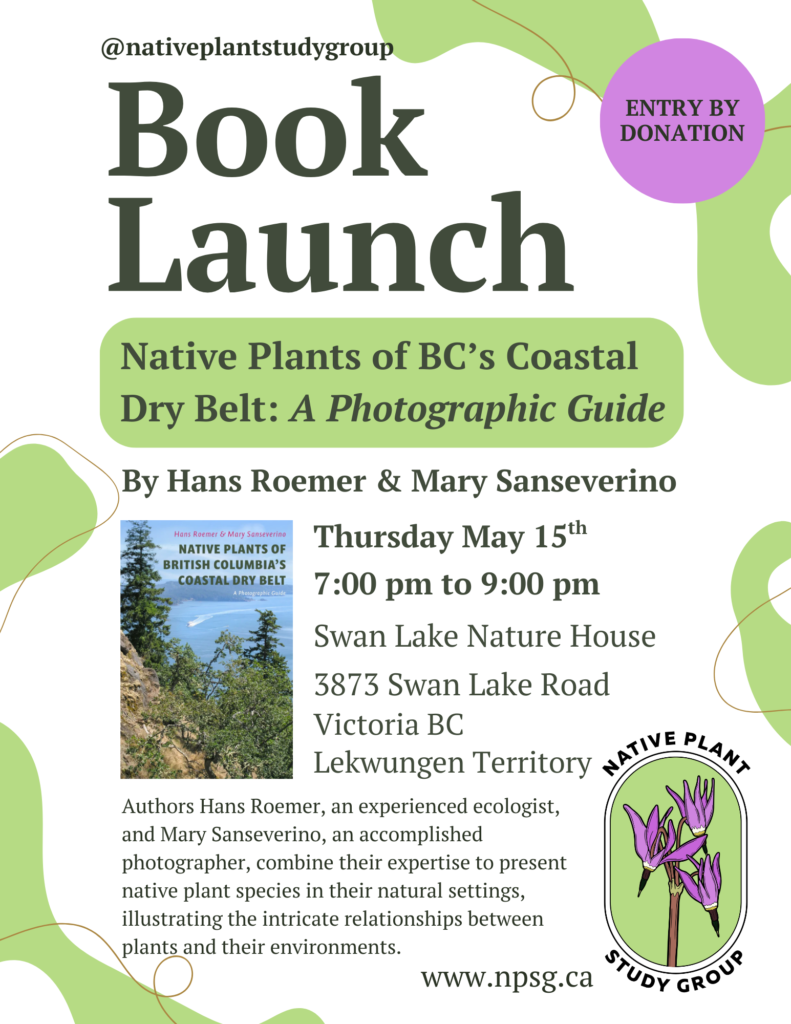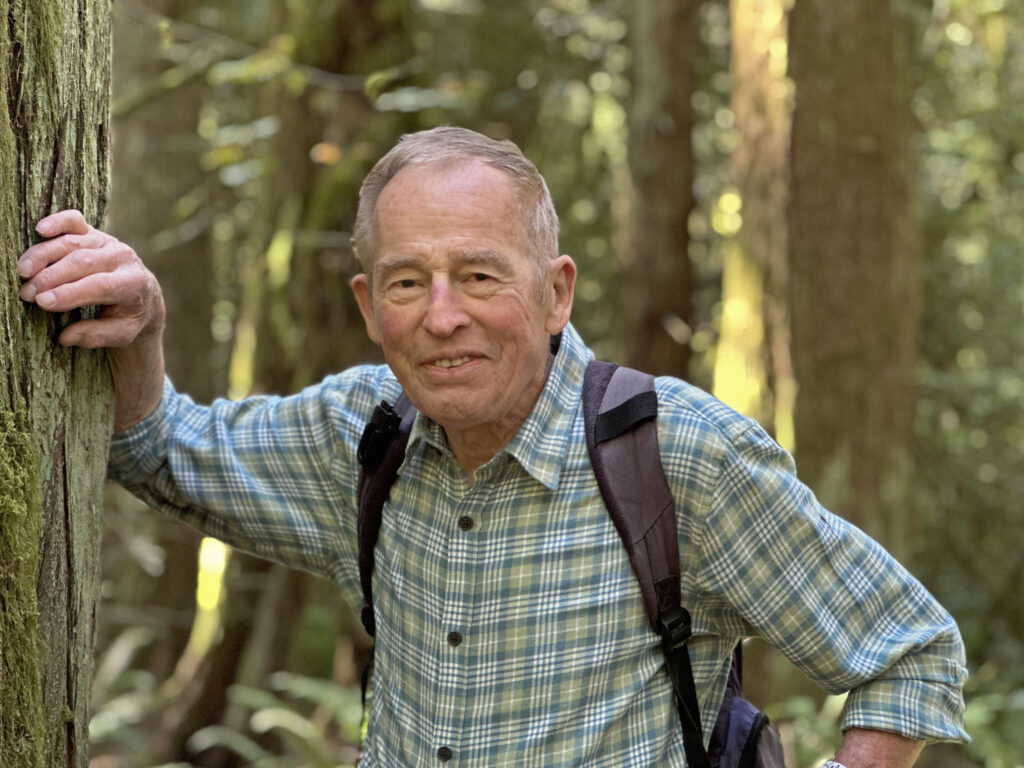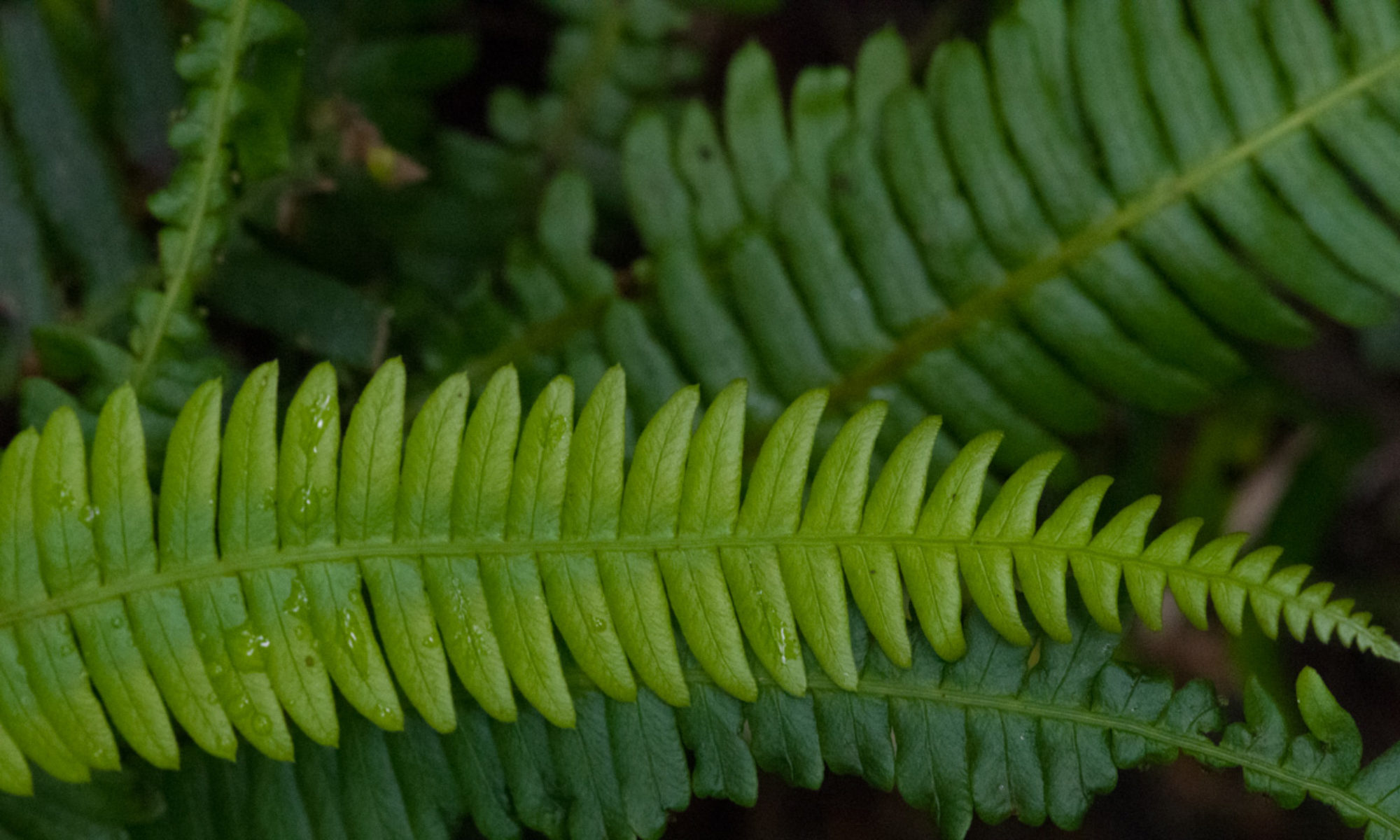Our Next NPSG Event is Guest Speakers & Meeting
Thursday May 15th 2025 at 7:00pm
Swan Lake Nature House and on Zoom
Special Event Book Launch! Native Plants of BC’s Coastal Dry Belt
with Hans Roemer and Mary Sanseverino

Book Launch: Native Plants of BC’s Coastal Dry Belt
Join Hans and Mary for a look between the covers of their new book, Native Plants of BC’s Coastal Dry Belt. By presenting native plants in the context of their ecosystems, Hans and Mary will outline how this guide helps us become more familiar with (or delve more deeply into) key elements of our regional vegetation. This approach offers the advantage of selecting and visually identifying those plants that are specific for easily defined plant communities, one plant community at a time.
Drawing deeply on Hans’ extensive ecological and botanical expertise and Mary’s technical proficiency, this image-rich presentation will take us through many of the native plants and supporting ecosystems that existed in pre-colonial contact times – native plants that are now essential indicators for conservation.
There will be plenty of time for Q&A and the book is available for pre-order to pick up at Swan Lake on the book launch night!
About Speakers
Hans Roemer – Originally educated in Germany, Dr. Hans Roemer, is a plant ecologist and botanist who has worked for many years in the BC Ecological Reserves Program and in BC Parks. Subsequently, as a consultant, he analyzed vegetation for public and private bodies in BC and for a few federal government projects, mainly focussing on rare species. The regional plant life emphasized in this new book has always been central to his interests and the information on it has been accumulated over his Canadian life time, starting with a PhD dissertation in 1972/73 at the University of Victoria.

Mary Sanseverino – Mary is a retired faculty member from the University of Victoria’s Department of Computer Science. Most at home in the mountains with a camera in her hand, Mary looks for any excuse to get out in the hills. For almost 15 years she has been associated with Canada’s long-running Mountain Legacy Project (historic repeat mountain photography and landscape-level analysis). A member of the Alpine Club of Canada, Mary often leads nature/citizen science-based trips. She is a regular contributor to the ACC’s State of the Mountains Report. Her photographic work has appeared in Canadian Geographic, Discover Magazine, Parks Canada, and here on southern Vancouver Island with CRD Parks.

In Person Location: At the Swan Lake Nature House, 3873 Swan Lake Road -> Link to Map
Cost: Free event but donations gratefully accepted! Everyone welcome, and no need to RSVP.
What to Expect:
6:30-7:00 Volunteer Set up and socialize (anyone welcome to help for 3 free raffle tickets!)
7:00-7:20 Introductions & Welcome, Announcements, Question Jar
7:20-8:30 Presentation including Q&A
8:30-8:45 Tea & Cookies break
8:45-9:00 Plant Raffle!
Help with set up or bring cookies to share for 3 free raffle tickets!
Note: This talk will be recorded, and all speaker talks are shared to NPSG members. To become a member, visit npsg.ca $25 for the year.
What to bring:
- A mug for herbal tea or decaf coffee
- A friend if you want
- Some small change for cookies, tea, or raffle tickets
- Drop in admission is by donation (if possible), or $25 for your annual 2025 membership fee
- Native plant or native seeds if you have extra for the plant raffle
- A flashlight as the path is not well lit leading to the Nature House from the Parking Lot
Accessibility Notes:
The Nature House Building is on the ground/main floor and is wheelchair accessible up a concrete path with a slight incline. There are two accessible parking spots at the very end of Swan Lake Road here past the main parking lot, about 20 steps from the front door. The area is not well lit – flashlight or additional light is recommended. Washrooms are accessible inside the building. There is a HEPA filter air purifier we turn on during our meetings, masks are not required.
Territorial Acknowledgement:
The Native Plant Study Group respectfully acknowledges that we meet on the unceded territory of the W̱SÁNEĆ and Lekwungen Peoples. We are a garden group with a strong interest in gardening with native plants for their aesthetic, intrinsic, and conservation values. We gratefully recognize the longstanding stewards of these plants and ecosystems, as well as their cultural significance.
We encourage a safe and respectful space for everyone to learn along with us in our individual and collective pathways of decolonization.
Registration Information is also sent via the NPSG email newsletter. Please send us an email at nativeplantstudygroup@gmail.com if you have problems or questions.
Native Plant Study Group is on Zoom!
NPSG is still using Zoom to host our monthly talks, and we host in-person events as well. Meeting details will be sent out via the NPSG email newsletter. If you would like to become a member, please see our Membership Info.
Who We Are
The Native Plant Study Group respectfully acknowledges that we meet on the unceded territory of the W̱SÁNEĆ and Lekwungen Peoples. We are a garden group with a strong interest in gardening with native plants for their aesthetic, intrinsic, and conservation values. We gratefully recognize the longstanding stewards of these plants and ecosystems, as well as their cultural significance.
General meetings are held on the third Thursday of each month from September to May (except December) and feature a speaker, draw for native plants, and discussion.
Many thanks to our Sustaining Supporters!
These businesses provide discounts to our active card-holding members:
- Borden Mercantile
- Buckerfields
- Dig This
- Garden Works
- Satinflower Nurseries (formerly Saanich Native Plants Nursery)
Territorial Acknowledgement:
The Native Plant Study Group respectfully acknowledges that we meet on the unceded territory of the W̱SÁNEĆ and Lekwungen Peoples. We are a garden group with a strong interest in gardening with native plants for their aesthetic, intrinsic, and conservation values. We gratefully recognize the longstanding stewards of these plants and ecosystems, as well as their cultural significance.
We encourage a safe and respectful space for everyone to learn along with us in the process of decolonization.


